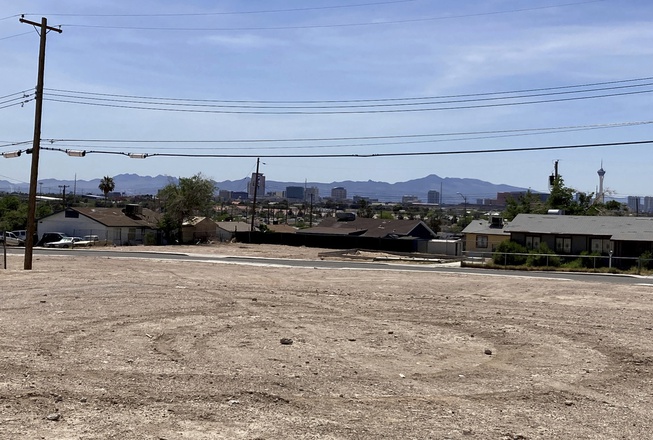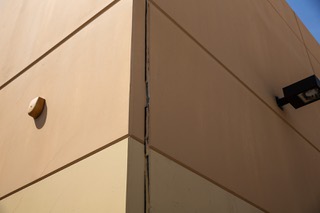
Ken Ritter / AP
Vacant lots where homes once stood sit in the Windsor Park neighborhood of North Las Vegas on Thursday, April 27, 2023.
Published Thursday, June 22, 2023 | 11:42 a.m.
Updated Thursday, June 22, 2023 | 4:49 p.m.
Related story
Families from Windsor Park, the once-segregated North Las Vegas neighborhood that’s been sinking since the 1980s, are celebrating the adoption of legislation that will provide funding for relocation efforts.
Senate Bill 450 lays out a $37 million plan to develop a new neighborhood so the owners of the remaining 90 or so single-family homes in Windsor Park can exchange them for new ones nearby, state Sen. Dina Neal, D-North Las Vegas, said at a community gathering Wednesday night at Macedonia Baptist Church. The legislation, which was signed into law last week by Gov. Joe Lombardo, also makes it illegal to resell the sinking houses.
“We’re here because we need to finally close the Windsor Park story with justice,” Neal said.
The 48-acre, historically Black subdivision near Martin Luther King Boulevard and Carey Avenue was built between 1964 and 1966, and had 241 homes for Black families during an era of housing segregation. Aggressive groundwater pumping throughout the Las Vegas Valley before 1971 caused the ground to sink, called subsidence, throughout the city.
No area was harder hit than the land beneath the neighborhood.
Some of the remaining houses are tilted at extreme angles, foundations are cracked, sidewalks are broken and streets are warped. The shifting ground wreaks havoc with buried gas, water and sewer lines.
Windsor Park was built on fault lines and within a subsidence “bowl” that can result in fissuring as well as the ground sinking.
“They had no idea that when they said, ‘We want to build this community,’ that a geotechnical study should have been done to tell them they were building on fault lines,” Neal said in April. “They did not know that.”
In the early 1990s, the city of North Las Vegas administered a $14 million relocation program to a new neighborhood northeast of the original, dubbed “Baby Windsor” by residents. But Neal said those homes were poorly constructed.
Another program paid residents $50,000 or $100,000 grants to help with relocation.
“This wasn’t about payback; this was about justice,” Neal said. “This was about, ‘How do I best serve and bring back the remedy for the last 90 originals who said, ‘I’m not going to Baby Windsor.’ ”
Neal said $25 million will come from COVID-19 relief dollars and $12 million from a state housing fund that North Las Vegas will be expected to repay over four years. Starting July 1, the Nevada Department of Business and Industry housing division will issue a request for proposals from developers and create the exchange program.
Single-family residential homeowners in Windsor Park who opt into the program will also get a $50,000 payment to help with property taxes on their new homes, which will be the size of the originals. The law requires a study of the land that will hold the new homes to ensure those homes won’t sink.
Residents of the Baby Windsor neighborhood can receive $15,000 in restitution payments to rehab their homes. That money will come from city funds leftover from previous relocation efforts, about $2.7 million.
The bill requires residents to stay in the new property for at least five years before selling, which didn’t sit well with at least one member of the Windsor Park community.
Corey Johnson said when his grandparents moved into one of the new homes in 1996, a city ordinance required residents to live there for 10 years before selling.
When his grandfather died in 2004, after eight years, he said the house would not have belonged to his family anymore if not for his grandmother managing to afford it. He questioned why the bill required residents to live in their homes for five years.
“So we don’t go from one injustice to another compound injustice, how do some of the members of the 95 houses that are still there. … Let’s say they don’t make it five years. Are they going to be able to pass down that generational wealth?” he asked.
Neal said the five-year rule doesn’t prevent the homes from being passed down to family members if the owner dies and is mostly there to prevent people from selling off their new homes immediately.
— The Associated Press contributed to this report.
[email protected] / 702-948-7836 / @Missmusetta

